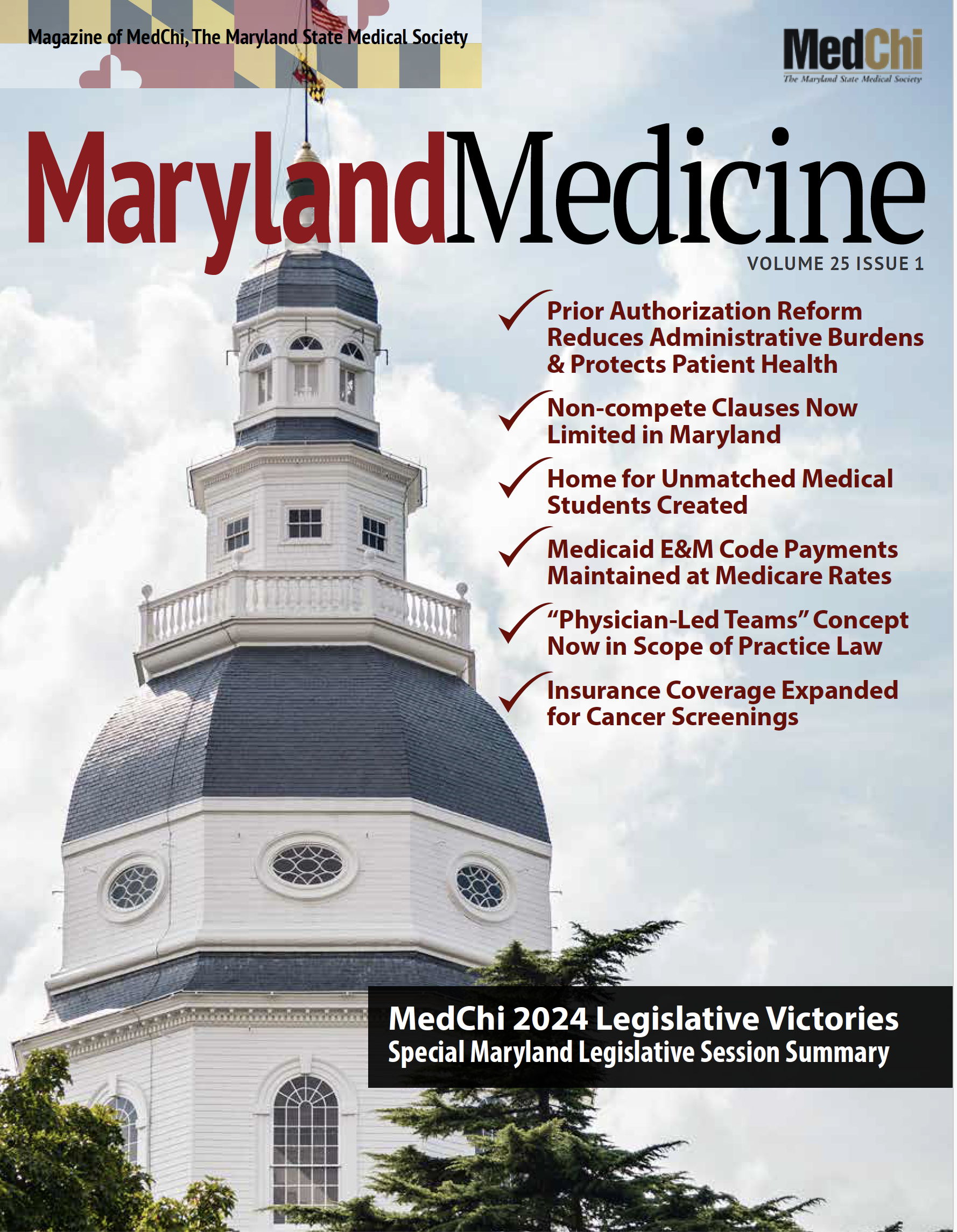Previously published in Maryland Medicine, Vol 25 Issue 1 – After three long years of unwavering work, legislation which reforms the Maryland Physician Assistant (PA) law (House Bill 806/Senate Bill 167: Physician Assistants – Revisions – Physician Assistant Modernization Act of 2024) was finally adopted. Discussions between MedChi and the PAs initially began during the 2022 Session but took on more urgency in the recent interim given the directive from both House and Senate leaders that legislation would be adopted in 2024.
This bill embodies the principles set forth by the physician workgroup established in 2022, namely that physicians remain the leaders of the patient-care team and retain control over the scope of practice and actions of PAs. This legislative resolution comes at a time when other states are allowing PAs to practice independently; the effort is forestalled here because the Legislature now considers the issue resolved for the foreseeable future.
Acknowledgement must be given to those MedChi members who worked on the successful passage of this bill, including Jim York, MD (orthopedic surgeon), Mike Niehoff, MD (family physician), Loralie Ma, MD (radiologist), Doug Mitchell, MD (internal medicine), Mike Silverman, MD (emergency physician), and MedChi President Ben Lowentritt, MD (urologist).
The final product required some give and take throughout the process but reflects a solid product that achieves all our initial goals. The bill takes effect October 1, 2024.
House Bill 806/Senate Bill 167: Physician Assistants – Revisions (Physician Assistant Modernization Act of 2024)
1. Requires a Collaboration Agreement rather than the current Delegation Agreement.
2. Defines “Collaboration” as being a physician-led team, the first reference to this concept in Maryland law.
3. Allows the Collaboration Agreement to be entered into by a physician or group of physicians, but not an administrator of an entity, as was sought by the PAs initially.
4. Sets forth the required contents of the Collaboration Agreement.
5. Expressly prohibits independent practice by PAs.
6. Specifically includes PAs in the non-economic damage cap statute, which already covers most other health occupations.
7. Retains existing law providing that the scope of the PA practice must be:
• Appropriate to their education, training, and experience;
• Customary to the practice of the physician (versus the setting, which is what the PAs pressed for); and
• Consistent with the Collaboration Agreement.
8. Revises the core duties that PAs can perform but preserves the current law governing a PA’s review and interpretation of diagnostic and other patient data.
9. Allows a physician to limit the PA’s scope of practice and detail their practice in the Collaboration Agreement.
10. Allows a physician to delegate acts to no more than 8 PAs while on duty. These limits do not apply in hospitals and certain other settings, as per current law.
11. Revises the approval process required for PAs to perform advanced duties as follows:
(These limits were referred to within the physician workgroup as “the three Guardrails”).
• “Advanced duties” are those duties requiring additional training beyond the basic PA education required for licensure.
• Under current law, the general rule is that advanced duties require approval by the Board of Physicians (“Board”). However, there is an exemption from that requirement for hospitals and ambulatory surgery centers, recognizing that there are credible outside checks and balances like accreditation, risk management and credentialing in those facilities to ensure that PAs are not given advanced duties they are not qualified for.
• The bill expands the list of exempt facilities to include federally qualified health centers (the PAs sought the inclusion of other facilities such as school-based health centers and local health departments, but these were opposed and not included in the final bill).
• Even in these exempt facilities, an internal process must be in place for advanced duty approval.
• Outside of exempt facilities, Board approval is still required for advanced duties unless:
◊ The PA has previously been approved for that advanced duty by the Board but changes places of employment; or
◊ The PA has over 7,000 hours (approx. 3.5 years) of clinical experience and the physician and PA document the training for the advanced duty.
◊ Even here, the advanced duty must comply with the “3 Guardrails” stated above.
• Clarifies the dispensing laws governing physicians and PAs.

SMWK is a leading law and lobbying firm that represents association, corporate, and non-profit clients before Maryland legislative, executive, and regulatory bodies. Our team has a wealth of collective experience advocating on behalf of our clients before Maryland government. SMWK was founded by Joseph A. Schwartz, III in 1978 and is located at 20 West Street in historic downtown Annapolis, just steps from the Maryland State House.

